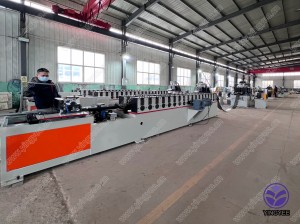
Understanding Carbon Steel ERW Tube Mills A Comprehensive Overview
Electric Resistance Welding (ERW) tube mills are an essential part of the modern steel manufacturing process, particularly when it comes to producing carbon steel tubes. Carbon steel, known for its strength and durability, is widely used in various industries such as construction, automotive, and energy. The ERW tube mill plays a crucial role in shaping and fabricating these materials into usable products.
At its core, the ERW process involves the formation of flat carbon steel strips into tubular shapes, which are then welded together using electric resistance. The manufacturing process begins with the selection of high-quality carbon steel coils, which are fed into the mill. The initial stage involves uncoiling the strip, followed by the edge preparation, where the edges of the steel strip are trimmed and conditioned to ensure a precise fit for welding.
Understanding Carbon Steel ERW Tube Mills A Comprehensive Overview
One of the significant advantages of the ERW process is its efficiency. The process not only minimizes waste but also allows for high-speed production. Advanced tube mills can produce thousands of meters of welded tubes in a single day, making them a preferred choice for manufacturers who require large quantities of carbon steel tubes.

Moreover, ERW tube mills are highly versatile. They can be designed to produce a variety of tube sizes and wall thicknesses, catering to differing industrial applications. This flexibility allows manufacturers to meet specific customer demands, whether it’s for structural applications, pipelines, or industrial equipment.
Quality control is another crucial aspect of the ERW tube mill process. Advanced technology enables real-time monitoring of the welding parameters, ensuring that the weld quality meets industry standards. Non-destructive testing methods, such as ultrasonic and eddy current testing, are often employed to detect any potential defects in the weld seam. This commitment to quality is essential, as the reliability of carbon steel tubes is paramount, especially in critical applications like oil and gas transportation where any failure can have catastrophic consequences.
Sustainability is also becoming increasingly important in the carbon steel production industry. Modern ERW tube mills are designed with energy efficiency in mind. They incorporate technologies that reduce energy consumption and minimize their carbon footprint during the manufacturing process. Additionally, the use of recycled steel helps in lowering environmental impact while maintaining the quality and strength of the final products.
In conclusion, carbon steel ERW tube mills are integral to the production of high-quality tubular products used across various sectors. The efficiency of the ERW process, combined with flexibility in manufacturing, ensures that these mills can meet diverse industrial demands while maintaining rigorous standards in quality and sustainability. As technology continues to evolve, the capabilities of ERW tube mills will likely expand, further enhancing their role in the steel manufacturing industry and contributing to more sustainable production practices.